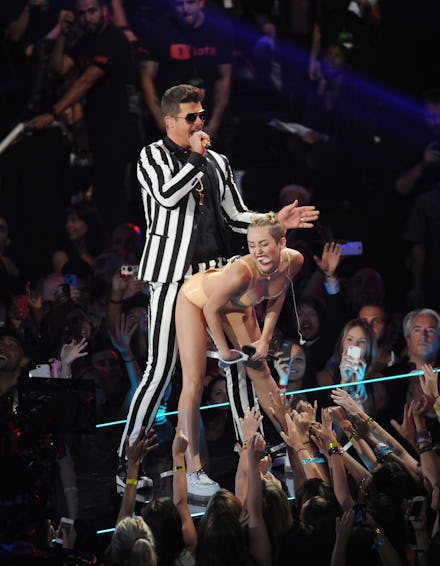Celebrity Feminists Are Hurting Feminism

Pop star Miley Cyrus and wannabe-star/TV personality Courtney Stoddard both made headlines recently for their statements asserting what big, true feminists they are. While most women's media outlets rejoice when a celebrity embraces the F-word, this latest round of proclamations was met with a collective sigh. These two women — and many female media stars — misunderstand feminism as sexual exploitation of the self or willful adherence to a traditional beauty standard. That belief continues to dominate modern culture, perpetuating one version of "sexy" and doing a disservice to the nuances of women's sexuality.
"Sex is one of the most interesting things we as humans have to play with, and we've reduced it to polyester underpants and implants. We are selling ourselves unbelievably short."
This hypersexualization, touted as feminism or female empowerment, is nothing new. It was defined as "raunch culture" by Ariel Levy in her 2005 book Female Chauvinist Pigs: Women and the Rise of Raunch Culture. As a backlash against the anti-sex, "prudish" focus of second-wave feminism, U.S. women made "kitschy, slutty stereotypes of female sexuality" mainstream, creating a culture of raunchiness that objectifies women and encourages them to objectify one another and themselves. In her book, Levy writes, "Sex is one of the most interesting things we as humans have to play with, and we've reduced it to polyester underpants and implants. We are selling ourselves unbelievably short." Dubbed, among other descriptors, "do-me feminism" in 1994 by Tad Friend in the Esquire article "Feminist Women Who Like Sex," it's an ideology that encourages women to believe that hyper-sexualizing themselves empowers them and helps them reclaim their sexuality as their own. It also implies that 'other' feminists don't like sex.
Instead of opening a dialogue about women's incredibly varied sexuality and developing theories on how they could take back ownership over it, a potential culture of sexual openness was reduced by the mainstream media to one of raunchiness. It became the idea that talking about how much you love blow jobs, lingerie, and pole-dancing is a form of feminism.
The ubiquity of this narrow type of feminism has served only to perpetuate a widely accepted idea of what being a sexual woman means. Women who purposely or unwittingly subscribe to it often think they're rebelling against the status quo, showing us some new definition of womanhood. But we're saturated in a sex-driven culture where six-inch heels, bodysuits, hairless genitals, and writhing on poles is our status quo. Where American Apparel's super-sexual ads featuring women in brokeback poses flash by us every few minutes on the freeway.
When Cyrus strips down to a thong bodysuit for a NSFW shoot with photographer Terry Richardson or twerks and rubs a foam finger in her crotch, when Rihanna posts topless selfies or gyrates onstage in a thong and stripper heels, when former Teen Mom-turned-porn-star Farrah Abraham says how awesome she thinks it is that people are going to "jack off to me" with her 2014 sex-toy line, when Katy Perry shoots whipped cream out of her bra or cartoonishly highlights her boobs, when Oxygen's reality show Bad Girls Club is in its 11th season, women aren't being offered anything new by this model of sexuality.
Madonna, Cher, even Britney Spears did it all before. There's no substance or message behind the new generation of thongs other than the standard "Look at me, I love sex." These things all perpetuate this mainstream, normalized type of "sexy," which is one that does nothing more than let women objectify themselves and each other.
While there are many counter-examples of prominent women in the media who don't create products that contribute to raunch culture — Lorde, Zooey Deschanel, Amy Poehler, Mindy Kaling, to name a few — the pervasiveness of the self-sexualization-as-empowered idea continues to dominate our screens because plenty of women in the spotlight continue to subscribe to it. Cyrus, Perry, Ke$ha — these women already have our attention, so why shouldn't they say something different?
There's nothing wrong or shameful in a woman expressing her sexuality in whatever form she wishes, in whatever form makes her feel she's in charge of it. If Cyrus wants to swing naked on a wrecking ball, she has the freedom to do so now more than ever. But it's important to distinguish if that expression is merely a repetition of the one form of sexuality we've been fed by mainstream media. Is leather underwear really the best we've got? Is this our stopping point? If there's no depth to sexual exploration, women are going to greatly hinder themselves from progressing past a place where pole dancing is enough to make them feel powerful.